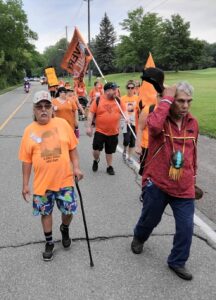Hundreds come together to bring Pikwàkanagàn child’s spirit home

By Rick Garrick
ALGONQUINS OF PIKWÀKANAGÀN— Hundreds of people turned out for the Walk for Joe Commanda, a 13-year-old Pikwàkanagàn citizen who died while running away from the Mohawk Institute Residential School in 1968. The walk was held from Aug. 27-29 from Brantford to Burlington to Toronto, with a vehicle convoy from Toronto to Pikwàkanagàn to complete the walk in the community.
“On Friday morning, we had a pipe ceremony at the [Woodland] Cultural Centre in Brantford, which was the residential school then,” says Loretta Nadeau, organizer of the walk, Joe’s sister and a Pikwàkanagàn citizen. “From there, we started walking at 8 (a.m.) and we continued until about 8:15 that night.”
Nadeau says there were more than 100 walkers when they left Brantford, noting that they followed the safest route, along Hwy. 2, Hwy. 52 and Hwy. 5, down through Mississauga, and then along Lakeshore Blvd.
“In Hamilton, we had two teachers that came out and walked with us,” Nadeau says. “[People] came up and talked; ‘What is this walk for?’ so we would explain what the walk was for, for the little boy that got hit by the train. We were going to bring him home, so it was like a spirit walk to bring this child’s spirit home, back to his First Nation. We explained that to the people, and they took it really good.”
But Nadeau says there were also some people who screamed and swore at the walkers.
“There was one guy that was calling the women down,” Nadeau says. “I was, ‘Just keep going, don’t worry about it, have a good day sir.’”
Nadeau says the community in Pikwàkanagàn was “out in full force” when they arrived.
“As you walked down to Pikwàkanagàn and crossed that bridge there were just people lined up on the road,” Nadeau says. “And they just fell in and joined the group.”
Nadeau says Joe and his 14-year-old brother Rocky ran away from the residential school to go to their sister’s home in Toronto.
“Rocky got apprehended in the Hamilton area and Joe got away somehow and he continued on down into Toronto,” Nadeau says. “When he got into Toronto, he was running on the railroad tracks and he got hit by a train [on Sept. 3].”
Nadeau says her parents didn’t know anything about their two sons running away from the residential school until after Joe had died.
“And that was the second time they had run away from that school,” Nadeau says. “Nobody contacted the parents to let them know this was happening.”
Nadeau says her parents took the case to court but the court found the residential school not responsible for Joe’s death.
“I’m just wondering with everything that is happening now, is this questionable? Would the outcome be different?” Nadeau says.
Nadeau says the walkers wore orange shirts with a picture of Joe on the front.
“But it wasn’t just for Joe, I think it was for all the children that were there,” Nadeau says.
Nadeau says she first told her sisters about her plan to organize the walk for Joe, noting that she had always wanted to organize a walk for him.
“I said, ‘You can come with me if you want but if you don’t, I’ll do it by myself,’ and they were, ‘No, we’re coming with you,’” Nadeau says. “So I think it’s brought the family together, it’s brought the community together.”


